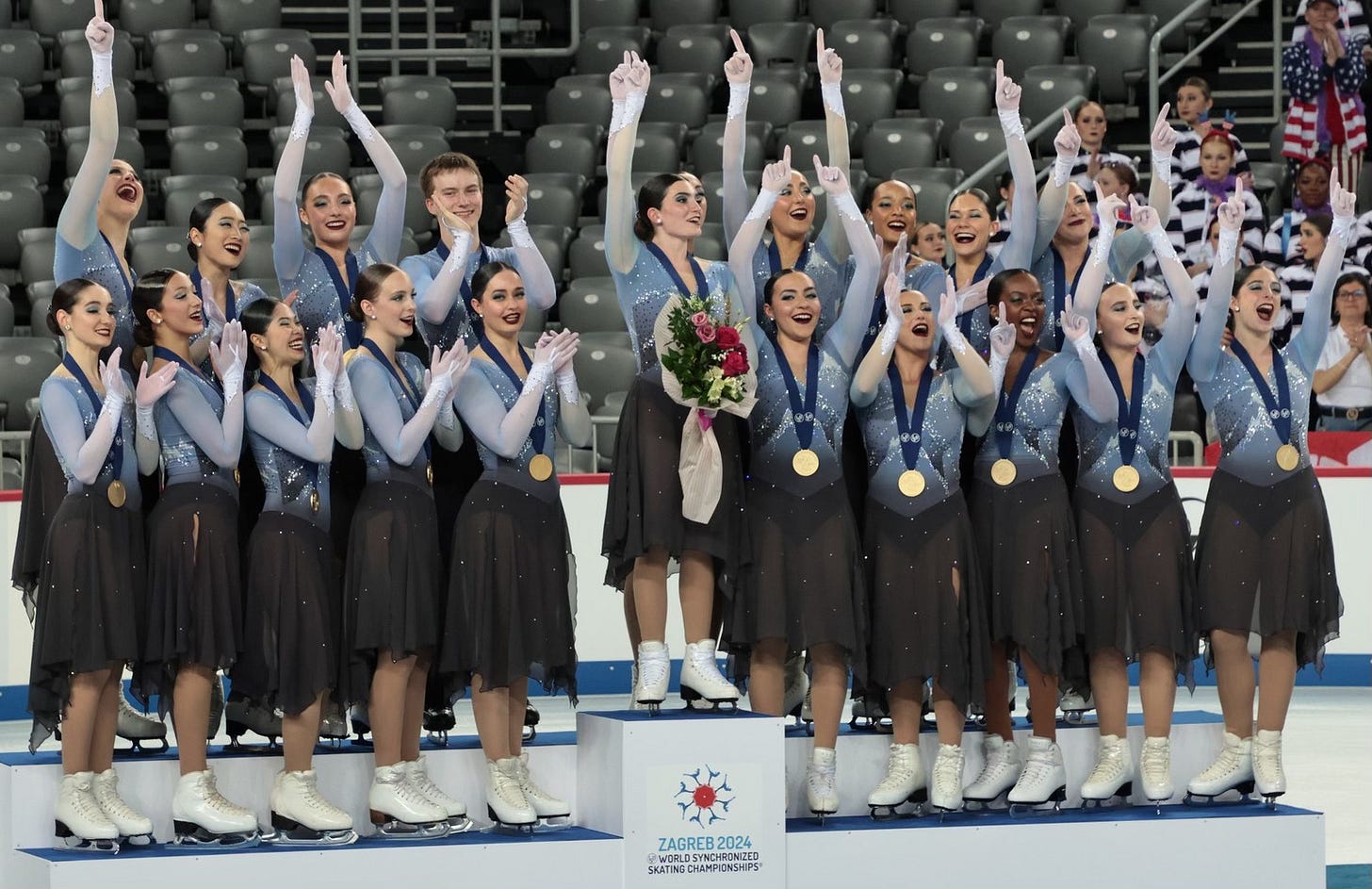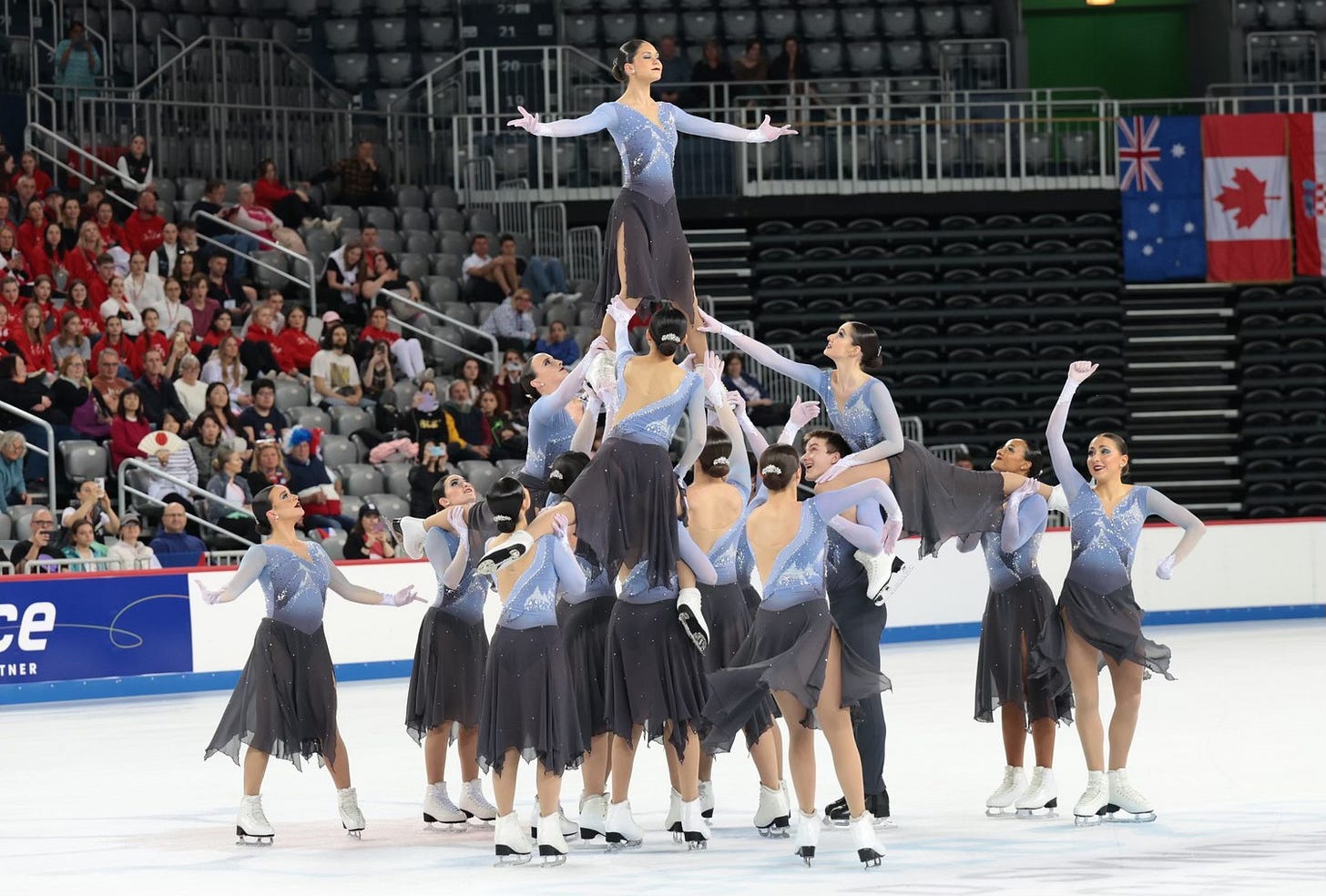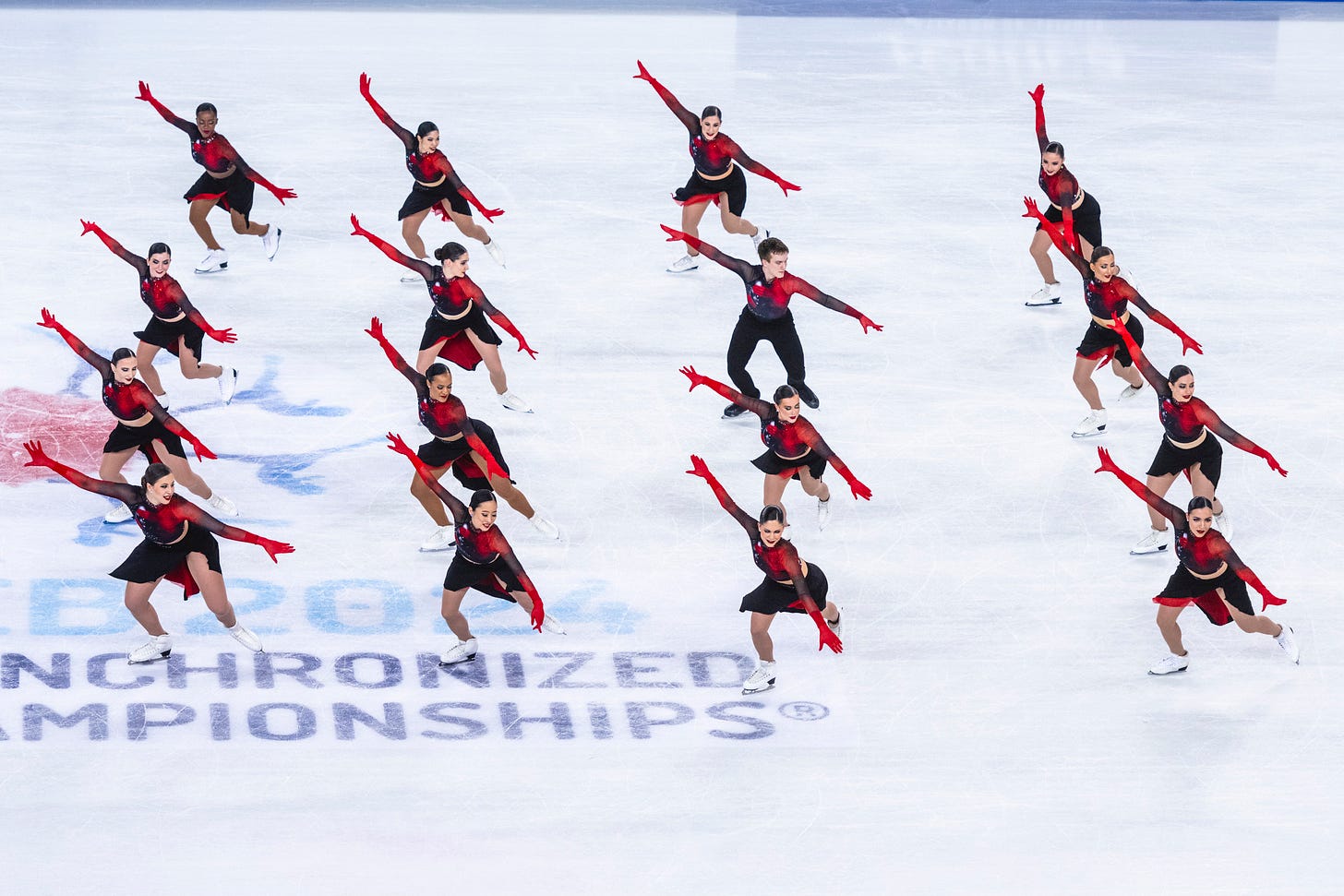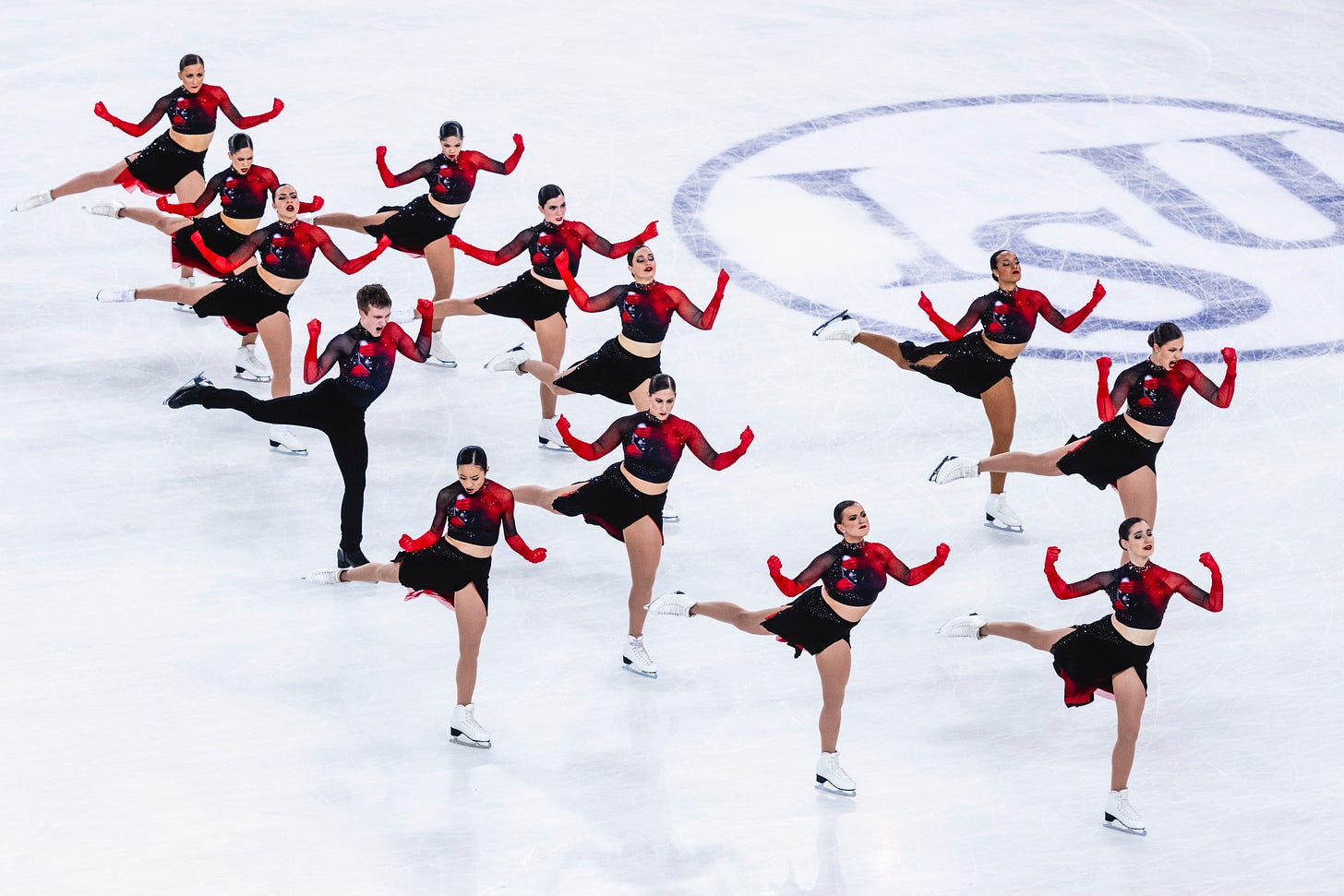'For us to make history, it's really amazing'
No team had ever won three straight titles at the World Synchronized Skating Championships. But Canada's Les Suprêmes changed that with their latest triumph last weekend in Zagreb.

What’s in a name, you say? Well, if you’re now a history making three-time world championship team, it’s a name that pretty much says everything.
Les Suprêmes indeed reigned supreme at the world synchronized skating championships last weekend in Zagreb, Croatia. But this wasn’t just a one-off for this talented crew from CPA Saint-Leonard in Montreal. The world title marked three in a row for Les Suprêmes, making them the first synchro team in history to achieve that feat. And it’s a spot in the record books that this team was very aware of even before they landed in Zagreb. One they had every intention of earning for themselves.
“I think it’s amazing. We’ve worked so hard this season,” said Julia Bernardo, who captains Les Suprêmes along with Olivia Di Giandomenico. “Over the years, there’s so many skaters that have been on our teams since it started, and I’m sure it’s been a goal for so long to even win the World Championships (once). For us to do it three times in a row and to make history, it’s really amazing, with all the hard work we’ve put in to get rewarded.
“Coming into this season, one of our goals was to be three-time World champions. It had never been done yet at the senior level (it’s happened twice previously at the junior level).”
It wasn’t exactly the smoothest road to the third gold medal. In the days before they departed for Croatia, one of the team’s skaters suffered an injury and had to be replaced — not exactly ideal when 16 skaters have to skate with such synchronicity during programs that are intricate in their details.
“We had a bit of a challenge with one of our teammates getting injured last Saturday … she went to the hospital just to see if it was serious or if she was going to be able to skate,” said Bernardo. “Unfortunately, she wasn’t able to skate, so we had two skaters learning her spot — one in the short program, one in the free program — which isn’t ideal going into the World Championships, having someone learn the spots so last minute. But they did such a great job; when you watched us skate, you couldn’t even tell it was new people learning the spots. We’re super happy with how it turned out.”
It’s been said often in many sports that defending a title can be more difficult than winning the first one. But Bernardo said she doesn’t necessarily believe that was the case for Les Suprêmes, who have now done that twice.
“Winning it the first time was something really amazing, because it was right after COVID and we hadn’t even been able to compete internationally that whole season. We only had the national championships and then our second competition of the season was actually Worlds,” she said. “So being able to win it for the first time that season was incredible because we didn’t even have such expectations in mind. Whereas this season, going into it as back-to-back world champions, we sort of had … not a bit more pressure, but we had higher expectations for ourselves. But I don’t think it was necessarily hard. Now that it’s our third time winning it, we’ve sort of got a plan in motion — we know what it takes to get there. And so I think we’re a bit more confident throughout the season, we know how hard to work, we know what we have to do exactly to accomplish our goal.”

And it was a wire-to-wire victory in Zagreb for Les Suprêmes, who turned in season best scores in both the short program (78.89) and free skate (159.08) to seize the gold. Their 237.97 overall total was 4.12 points better than that of The Haydenettes (233.85), an American team from Boston. The bronze went to the Helsinki Rockettes from Finland (229.84). A second Canadian entry, Montreal’s Nova, wound up fifth overall.
The theme for Les Suprêmes’ gold-medal clinching free program is Mount Everest, which symbolizes the team’s climb to the top of their sport’s summit.
“We go through the journey of climbing the mountain: the different challenges you face, different emotions,” Bernardo told reporters at the post-even press conference in Zagreb. “You get tired, you start having doubts but then towards the end of the program we get really excited that we're almost there, and we work together to achieve this goal of climbing the mountain.”
Added Di Giandomenico: “Our goal coming into the competition was to have a clean skate and be happy when we get off the ice, regardless of what the result was. As soon as we hit the ending position, we were really happy no matter what was going to happen.”
The joy of skating plays a huge role, indeed, in this team’s continued success. Bernardo, a 24-year-old student at Concordia University, where she studies accounting, believes it is at the heart of everything they do, and the culture Les Suprêmes have built along the way. Asked to describe what it is that makes the team so good, she offered up this …
“We’re so lucky to be coached by some amazing coaches: Marilyn (Langlois), Pascal (Denis) and Amelie (Brochu). They have so much wisdom and knowledge of synchro over the years that they’ve been coaching, and I think we’re really lucky because each brings something special to the team,” said Bernardo. “They each have their own strengths, so of course we wouldn’t be where we are without them. But also we have such an amazing support system from our parents — they’re always following us at competitions to cheer us on. We have old skaters who travel to watch us and cheer us on.
“And I think we have a really great chemistry as a team. Our goal is always to have fun. We have a quote that we say: ‘It’s not about being perfect, it’s about being awesome.’ So I think our culture is really about having fun, and that helps us to be successful and to keep it (that way) over the years.”
That passion for their skating is what allowed Les Suprêmes to go from the darkest days of their sport — two seasons essentially wiped out by the COVID-19 pandemic — to the top of the synchro world in 2022 on home soil in Hamilton, Ontario. Needless to say, restrictions on things like sizes of gatherings and social distancing weren’t exactly conducive to even practising a sport in which many elements involve multiple skaters touching each other. Their coaches came up with creative ideas like having skaters use sticks to connect to each other while maintaining the required social distancing.
“We weren’t training normally for I would say a good year and a half. When we were training normally, we had to skate with masks on,” said Bernardo. “It was harder to breathe when we were doing run-throughs wearing a mask. But we were just happy to be training normally again.”

They were absolutely ecstatic when competitions finally resumed in 2022. After winning a second straight Canadian title in Calgary, it was off to Hamilton for the Worlds, where they fended off the challenge of two teams from Finland for the gold. That Nordic country is the longtime power in the sport, with its 30 total medals at Worlds (including nine gold) doubling Canada’s collection of 15 — five of them gold (NEXXICE, a senior team based in Burlington, Ontario, owns two of them, won in 2009 and 2015). Sweden’s Team Surprise holds the all-time gold medal record with six, including four of the first six when synchro worlds started in 2000.
So how did Les Suprêmes emerge from the darkness of the pandemic to conquer the world? Allow Bernardo to explain.
“What gave us the ability to do that is, since we had that year and a half where we weren’t really able to do our passion and skate normally … when we finally got back to the ice, I think we were just so happy to be there and to be together and be able to skate again that we didn’t waste any time,” she said. “Every practice, we had fun, we were motivated, and when we got to the World Championships, we didn’t really put pressure on ourselves to perform a specific way. We were really just happy to be there again after so long, and our joy of skating and how happy we were to be there is what made us so successful.”
This is also a program built to maintain that success. Les Suprêmes runs synchro programs from pre-novice all the way up to senior, and its junior team also broke through for a world title this season — a first for any Canadian team at junior worlds. Meaning when the senior team undergoes some turnover (Bernardo says last season’s team included 11 new skaters, for example), there are talented juniors eager to make the jump up to senior. And they are well prepared to make that move to a higher level.
“Our two coaches, Marilyn and Pascal, also coach the junior team. So when they move up, they have the exact same skating skills, the exact same culture and everything as the senior team,” said Bernardo.
So it is that you’ll find a wide range of ages on the senior team, with team members ranging from 17 to 28 years old. Some, like Bernardo, are students. Others have full-time jobs and careers. Yet they all bond over their passion for skating, and find a way to keep sharing the ice as one for three practice sessions per week at Arena Roberto Luongo (named after a Hall of Fame hockey goaltender) and sometimes on weekends. And that doesn’t include the off-ice work Les Suprêmes does with ballet and mental and physical performance coaches (one of whom comes from the famed Cirque du Soleil), each one of them trying to give this team every little edge it can get.
“There are a lot of people who help us off ice so we are able to do what we do on the ice.” said Bernardo.
Les Suprêmes has a long history with synchro, going all the way back to their first medal at the Canadian championships (a silver) in 1992. The Montreal-based team watched others, such as Les Pirouettes de Laval, Black Ice and NEXXICE dominate in Canada, winning 24 of 28 national titles between 1990 and 2018 (Les Suprêmes was golden in 2003, 2004 and 2016). But since 2020, Les Suprêmes has built a run of four straight national titles (the event was cancelled in 2021 because of COVID). And now they’re taking that success to the World level in unprecedented ways.

While it would be easy to suggest it’s World gold or bust for this team moving forward, given their historic run, Bernardo says that’s not what it’s all about.
“We always set our goal at the beginning of the season in terms of results but as the season goes on, it sort of shifts to having fun,” she said. “You can’t control the result and how judges are going to score you, but if we can get off the ice happy with our skate and we made good memories, then we can’t ask for more.”
Well, there is one thing they can wish for, something that every synchro skater around the world dreams about. And that’s the inclusion of their sport in the planet’s biggest winter sports festival.
“That’s the dream, that one day we will get to be in the Olympics. I know they’re really trying to get it in,” said Bernardo. “There were some discussions about whether the teams are too big, so they created a new category, which is Elite 12: a smaller size of teams. I know there’s a lot that goes into becoming an Olympic sport, but I know they’re trying really hard.”
One step of inclusion that came at home first occurred in 2023, when Skate Canada decided to add synchro skating to its national championships for singles, pairs and ice dance (previously, synchro had its own separate nationals). It is a level of acceptance cherished by senior and junior synchro teams across the country, and they’re thrilled to be a part of it.
“We love it. It means so much to us to finally be included in the Canadians, so we’re among all the greatest athletes in Canada, all the different disciplines,” said Bernardo. “We grew up looking up to them, all the different disciplines, so just to be with them and included with them, it just feels amazing that we are finally side by side with them.
“It’s definitely a great step for our sport. I’ve also noticed they’ve been so supportive of us. This past weekend, when we won Worlds, there were a lot of ice dancers, pair skaters, all different Canadian disciplines that were congratulating us. It feels amazing for us to be recognized by them.”



